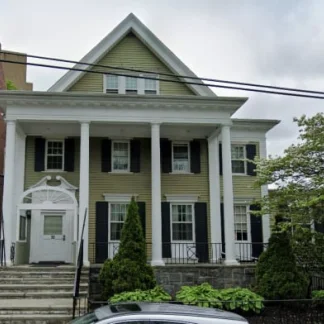Wellmore Behavioral Health - Waterbury
Wellmore Behavioral Health – Waterbury is a private rehab located in Waterbury, ...
Connecticut Renaissance - Central Avenue is an outpatient facility that offers treatment for individuals that have a Mental Health diagnosis and/or Substance Addiction. Connecticut Renaissance - Central Avenue is located at Waterbury, Connecticut
Connecticut Renaissance – Central Avenue is committed to help patients make a positive change in their lives. They are dedicated to empower clients that have been affected be behavioral health. Their program uses the best practices in a caring environment. There core values are: Respect, Dignity, and Passion
Connecticut Renaissance – Central Avenue’s services come from therapies that have undergone scientific rigor and research, which allows patients to gain the best tools for a positive change in their lives. Some of the services offered are: psycho-educational groups, stress and anger management, and relapse prevention.
Contact us for more information: (203) 346-1931

Connect with Connecticut Renaissance - Central Avenue by calling their admissions team directly.
(203) 346-1931 Website Get DirectionsResearch clearly demonstrates that recovery is far more successful and sustainable when loved ones like family members participate in rehab and substance abuse treatment. Genetic factors may be at play when it comes to drug and alcohol addiction, as well as mental health issues. Family dynamics often play a critical role in addiction triggers, and if properly educated, family members can be a strong source of support when it comes to rehabilitation.
Group therapy is any therapeutic work that happens in a group (not one-on-one). There are a number of different group therapy modalities, including support groups, experiential therapy, psycho-education, and more. Group therapy involves treatment as well as processing interaction between group members.
In individual therapy, a patient meets one-on-one with a trained psychologist or counselor. Therapy is a pivotal part of effective substance abuse treatment, as it often covers root causes of addiction, including challenges faced by the patient in their social, family, and work/school life.
Group therapy is any therapeutic work that happens in a group (not one-on-one). There are a number of different group therapy modalities, including support groups, experiential therapy, psycho-education, and more. Group therapy involves treatment as well as processing interaction between group members.
In individual therapy, a patient meets one-on-one with a trained psychologist or counselor. Therapy is a pivotal part of effective substance abuse treatment, as it often covers root causes of addiction, including challenges faced by the patient in their social, family, and work/school life.
In individual therapy, a patient meets one-on-one with a trained psychologist or counselor. Therapy is a pivotal part of effective substance abuse treatment, as it often covers root causes of addiction, including challenges faced by the patient in their social, family, and work/school life.
Wellmore Behavioral Health – Waterbury is a private rehab located in Waterbury, ...
Connecticut Renaissance - Wolcott street is residential facility that offers tre...
Connecticut Junior Republic provides behavioral health services for children, ad...
Wellmore Behavioral Health – Naugatuck is a private rehab located in Naugatuck, ...